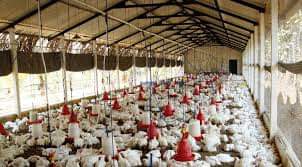1. Ascites is an accumulation of noninflammatory transudate in one or more of the peritoneal cavities or potential spaces.
2. Age affected: young, fast growing birds broilers.
3. Causes:
Non-contagious. Influenced by
a) genetics,
b) breeding,
c) nutrition,
d) growth rate,
e) ambient temperature
f) and oxygen content of the air
.
4. Hypoxia caused by
a) altitude or gas fumes,
b) carbon monoxide from brooders, worse in winter (tight house),
c) stress of mycotoxins, toxic fat,
d) increased salt in the diet and/or coal tar disinfectants causes ascites.
5. Respiratory disease can aggravate the problem.
6. Clinical signs: Water-belly, abdominal distension, reluctance to move, dyspenic and cyanotic lesions seen. Affected birds are smaller than normal, and listless with ruffled feathers.
7. Mortality ranges from 0.5-20% of the flock.
8. Treatment:
a)Adequate temperature control of the house,
b) good air and litter management,
c) reduced sodium and furazolidone content of diet and water, feed
d) and light restriction will reduce the mortality.
9. Immuno modulators :
Immuno modulator are used to enhance immunity in broilers.
10. Feed need to be supplemented with good quality toxin binders and acidifiers to take care of mycotoxin and microbial (bacterial and fungal) load respectively.
11. If the altitude cannot be changed, the feed ration should be changed to a dense (lower energy) feed. Practice mash feeding instead of pellets or use a restrictive lighting.
11. Good Practice Based on Current Knowledge.
12. Do not use drinking water with a high salt content.
13. Avoid feeds with a high salt content.
14. Provide broilers kept at high altitudes with well-insulated housing.
15. Use immuno modulators to enhance immunity in broilers.
By Dr V. Rajendra Prasad, Hyderabad.






